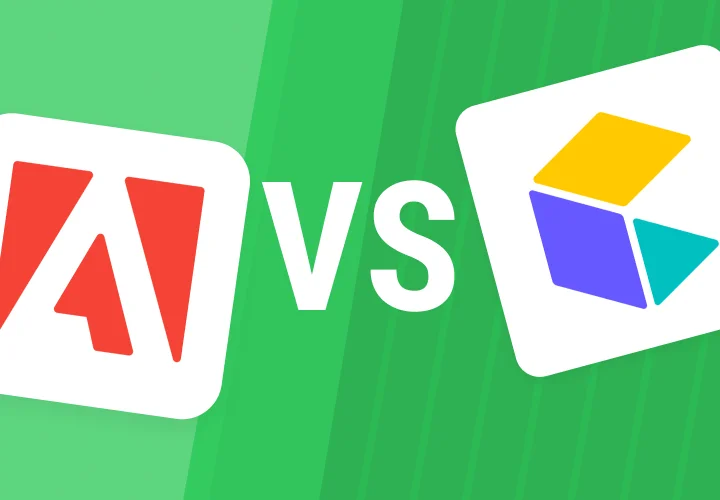Shopify or Custom Website Development - Which One to Choose in 2025?
Table of contents
- Shopify vs. Custom-built Website: Pros and Cons
- 1. Technical Characteristics (Performance)
- 2. Development Time
- 3. Freedom in Product Development
- 4. Presence of Mobile Version by Default
- 5. Cost of Development, Support, and Updates
- 6. E-commerce Capabilities (Product Management, Payment)
- 7. Integrations with Various Applications
- 8. Security
- 9. Marketing and SEO
- Drawbacks of Shopify
- Drawbacks of Custom Website Development
- Additional Questions (FAQs)
- In a Nutshell
Emerline offers solutions for both creating a website on the Shopify platform and custom development. Whether launching an online store or planning substantial growth, our team is ready to support your E-commerce venture.
The E-commerce business is currently flourishing, accounting for a massive 20% of all retail sales worldwide. If you’re considering starting an online E-commerce store, then there’s no better time. When establishing your online presence, choosing the right platform is pivotal. As an entrepreneur, you will encounter a critical choice: Shopify or custom E-commerce website development? Understanding the benefits and drawbacks of both options will help you make an informed decision.
Shopify vs. Custom-built Website: Pros and Cons
Before choosing to opt for Shopify, powering over 4.5 million online stores, or custom development, let’s explore the nuances of both options.
1. Technical Characteristics (Performance)
Shopify: Known for its robust infrastructure, boasting an average uptime of 99.99%. This high uptime ensures your store is accessible to customers around the clock, minimizing downtime-related revenue loss.
Custom: Performance varies but can be optimized for exceptional speed and reliability. Custom solutions can be tailored to meet specific performance requirements, ensuring lightning-fast load times.
2. Development Time
Shopify: Offers rapid deployment with an average setup time of one to three days. This quick setup is a crucial advantage for businesses looking to launch their online presence swiftly and efficiently.
Custom: Development time can vary significantly but often takes several weeks to months. Custom development, while time-consuming, allows for meticulous attention to detail, resulting in a finely tuned website.
3. Freedom in Product Development
Shopify: Provides a structured environment with countless apps to extend functionality. This structured environment can accelerate Shopify web development and simplify adding features.
Custom: Offers unparalleled creative freedom to build unique features tailored to your business. With custom development, your imagination is the limit, allowing you to differentiate your brand.
4. Presence of Mobile Version by Default
Shopify: Mobile-responsive themes are standard for Shopify, catering to the 50.3% of E-commerce traffic coming from mobile devices. Ensuring mobile responsiveness is essential as mobile commerce continues to grow.
Custom: Requires dedicated development for mobile optimization. While it demands extra effort, custom mobile optimization can result in a seamless mobile user experience, critical for retaining customers.
5. Cost of Development, Support, and Updates
Shopify: Has a range of upfront costs with monthly fees starting at $25 for individuals and small businesses to $2,000 per month for Shopify Plus, which is perfect for enterprise-level companies. This cost structure makes it accessible to businesses of all sizes.
Custom: Higher initial investment, but you have control over long-term costs. Custom solutions may require more upfront investment, but ongoing costs can be tailored to your specific needs, potentially saving money in the long run.
6. E-commerce Capabilities (Product Management, Payment)
Shopify: Streamlines product management and integrates with 100+ payment gateways. This simplifies the selling process and allows customers to pay using their preferred methods.
Custom: Provides tailored E-commerce features, but development complexity may increase costs. Custom solutions can be fine-tuned to your unique product offerings and payment processes, enhancing the user experience.
7. Integrations with Various Applications
Shopify: Access to a vast app store with 6,000+ apps for seamless integration. These apps can extend the functionality of your store without extensive custom development.
Custom: Allows deep integrations with external services, enabling unique functionality. Custom integrations provide greater control and flexibility for businesses with specific needs.
8. Security
Shopify: Shopify prioritizes security and invests heavily in maintaining a secure platform. However, the level of control over security measures is somewhat limited. This may be sufficient for many businesses, but those with particular security requirements might find it fairly restrictive.
Custom: Custom website development offers complete control over security measures. This means you can design and implement security protocols tailored to your business needs and industry standards.
9. Marketing and SEO
Shopify: Offers built-in SEO tools, businesses on the platform generate an average revenue of $72 per visit from social media traffic. This built-in SEO can help you rank higher on search engines and capitalize on social media traffic.
Custom: Requires custom integration of SEO tools but provides flexibility for advanced marketing strategies. Custom solutions allow for advanced SEO strategies tailored to your unique business objectives, potentially delivering superior long-term results.
Drawbacks of Shopify
While Shopify offers convenience and a quick start for online businesses, it's essential to consider the potential drawbacks of the platform as well.
Transaction Fees: Shopify charges transaction fees for using external payment gateways. These fees can add up, especially for businesses with high transaction volumes. The standard rate is 2%, 1% or 0.5% for the Basic Shopify, Shopify, and Advanced Shopify plans, respectively. These fees can significantly impact profitability over time for businesses on a tight budget.
Complex Migration: While Shopify provides a user-friendly platform for initial setup, migrating a Shopify store to another platform can be complex. This complexity can become a hurdle if your business outgrows Shopify or if you decide to switch to a custom solution. Data migration, design transfer, and ensuring seamless functionality can be time-consuming and costly.
Increased Marketing Costs: Shopify is a popular E-commerce platform, and its competitive nature often leads to increased marketing costs. Businesses using Shopify may find themselves in a crowded marketplace where investing more in marketing is essential to stand out. This can be a challenge for smaller businesses with limited marketing budgets.
Drawbacks of Custom Website Development
Although custom development offers the advantage of a unique, scalable, and highly tailored solution, it also comes with its share of drawbacks.
Higher Upfront Costs: Custom website development typically involves higher upfront costs compared to platforms like Shopify. This is because custom development starts from scratch, requiring extensive planning, design, and coding. Businesses may need to allocate a substantial budget for the initial development phase, which can be a barrier for startups or small businesses.
Potentially Longer Development Timelines: Custom development projects often have longer development timelines. Designing and building a website tailored to your exact requirements takes time, especially if the project is complex. While this extended timeline allows for meticulous attention to detail, it may delay your online presence and ability to start generating revenue.
Ongoing IT Support and Maintenance: Custom solutions require ongoing IT support and maintenance to keep the website running smoothly. This includes regular updates, security patches, and troubleshooting. These ongoing costs can add up over time and should be factored into the total cost of ownership.
Additional Questions (FAQs)
Is it possible to have 2 websites in Shopify?
Yes, you can manage multiple stores within a single Shopify account, making it a viable option for expanding your E-commerce business.
Can I use a custom domain, or is a Shopify domain required?
The short answer is yes. Shopify allows custom domain integration, preserving your brand identity and professionalism.
Can I integrate my website with the Shopify platform?
Certainly, Shopify offers robust APIs, enabling seamless integration with external services and applications.
Is Shopify good for web development?
Shopify is an excellent choice for quick and reliable E-commerce solutions, while custom development offers unmatched flexibility for complex projects.
In a Nutshell
In conclusion, choosing between Shopify and custom development hinges on your unique business needs. Shopify is a good solution for businesses seeking rapid deployment, cost-effectiveness, and built-in E-commerce features. However, custom development empowers you with unmatched flexibility, scalability, and control over your online store.
At Emerline, we recognize the dynamic nature of the E-commerce market and offer tailored B2B E-commerce solutions that align with your business goals. You can also hire our offshore dedicated development team, and rest assured that the industry experts will take care of your E-commerce project.
Updated on Jan 9, 2024





